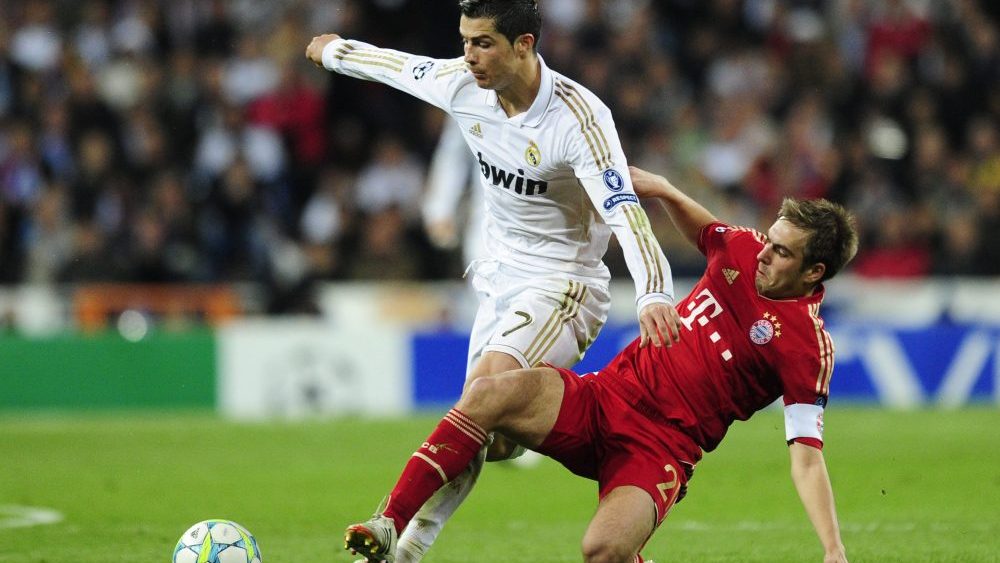Preview: FC Bayern – Real Madrid
For this first big highlight of the season, we’ve invited another guest to be interviewed. Clemens tells us what has gone on at Real Madrid since the last meeting between the two sides, what he thinks of Zidane, his predictions for the coming matches and much more.
Hello Clemens, first of all I’d like you to introduce yourself to our readers a bit. How did you become a Real Madrid fan, and are the Galacticos the only team dear to you?
Hello. I’m 22 years old, and I’m currently studying political economy in Vienna. When other people talk about the ONE moment when they became a fan of their club, I always get a bit jealous. To be honest, I don’t know exactly how it happened anymore. Certainly I’d say it’s because of the 2002 team with Raúl and Ronaldo. Alongside Real Madrid I also support SK Rapid Wien (though that’s quite tough at the moment) and Borussia Dortmund.
Under Ancelotti, Real were known for finding their best form in the most important games. The Italian’s time there was very successful. Why did he have to go, and is he somewhat missed?
I think it’d be hard to find fans of the club who say they don’t miss Ancelotti at all – he didn’t polarise enough for that; he’s too charismatic for that. How much the ‘Mister’ is missed, though, would probably depend on how you assess the events after his departure.
I do think that the majority of fans were rather bemused that he had to leave after just two years, when in the previous season he had achieved a milestone in the history of the club, winning La Décima, our 10th Champions League title. His second year mostly went really well too. Real Madrid were top of the table for the most part of the season, and were probably playing the best football that I’ve ever seen them play. Because of not enough rotation and the injury to key players like Luka Modric and Karim Benzema, performances dipped badly towards the end of the season.
After Benítez was also dismissed relatively early on, in came Zidane. He even won the Champions League, but in spite of that some Madrileños don’t seem so pleased. Why not?
Opinions vary on Zidane, despite the fact that in terms of his results you can hardly reproach him. With an average of 2.42 points per game, he leaves Ancelotti’s Madrid and Pep’s Barca (both averaging 2.36 PPG) behind him.
For some he’s a pragmatic coach who, after the failed stint of Rafael Benítez, pulled the club out of a hole and won our eleventh Champions League title. Those who back him would say he deftly solved problems such as the poor coordination in defensive phases with the introduction of Casemiro as a key player.
Others, meanwhile, criticise that the football we see is far below the level that should be possible with such a strong, well-equipped squad. For them, the offensive play is too simple, with practically the only danger created with crosses and set pieces.

(Photo: Carlo Herrmann / AFP / Getty Images)
Real’s last league title was five years ago. Is that excusable because of the two Champions League trophies and the one cup victory, despite the high expectations?
No, of course not. When you see how much potential the club has – be that the current squad or the financial power – then that’s clearly not enough. Even with such strong competition in FC Barcelona and, in recent years, Atlético Madrid.
Real Madrid are lacking consistency, which goes for squad building as well as the manager position: new building blocks are laid down before the previous foundations have been moved aside. The latest saga around Ancelotti, Benítez and Zidane is the best example for that.
Let’s talk about right now. Once again there’s an unbelievably tight race with Barcelona. At the moment, Real are top, three points ahead of their rivals. How do you see your title chances?
This position isn’t bad, being three points clear and having the chance to make it six in our game in hand at Celta Vigo. But even that wouldn’t be the end of it, because we go head to head with Barcelona on the 23rd of April, and the remaining fixtures aren’t easy for either of the giants. Looking at the standings now, you’d perhaps favour Real, but anything is still possible.
Matches against FC Bayern may also be something special for Real Madrid fans. What was the first impression when the draw was made?
I was really happy about the draw, even if supposedly every other opponent would have been easier. It’s games like these that are, for me, the charm of the Champions League. FC Bayern and Real Madrid: that’s possibly the biggest rivalry that international club football has to offer.
Now that you’ve had some time to set everything straight, what kind of games do you expect and where do you see Bayern’s biggest weaknesses?
I don’t think I’d be going out on a limb by claiming that Real Madrid will go for a more passive approach in the first leg and put the focus on retaining a tight formation. On turnovers and counter-attacks I expect the wings to be particularly targeted. That’s in part obviously because of the players available, but as well I do personally think that it could exploit a weakness in this season’s Bayern side. Sure, they’re good at locking down the centre and pushing opponents out wide, but once they’re there, Bayern tend to shuffle across quite untidily and so they have problems in winning the ball back.
What kind of weaknesses have Real Madrid shown of late which could play into Bayern’s hands?
Most of the time, the collective effort against the ball leaves something to be desired. It’s not for nothing that Real Madrid under Zidane concede on average more than a goal per game. But because of the strategic approach that I at least expect in the first leg, it should be possible to limit that weakness partially. Should we come to a situation where Real Madrid have to score, then I can imagine that they could have problems. The structures in ball possession aren’t very good. They often end up with a U-shape, whereby the ball is circulated from one flank to the other, with the centre abandoned. As a result, lots of crosses are put in, which for a team of this level isn’t exactly the best method for generating chances consistently.
If you could choose a Bayern player to play for Real, who would it be and why?
Manuel Neuer. I do rate Thiago, Boateng and Müller very highly, but there are already good alternatives in their roles in our squad. I see the biggest gap in quality between the sticks, no doubt. Neuer’s timing when rushing out and his quality on the ball would be, for me, a big upgrade.
To finish, I’d like you to make a prediction for both games. Who will make it into the next round and why?
I’ve rarely found it more difficult than now to make a prognosis for the result of a tie, but all in all I’d say Bayern are slight favourites. They have more of the balance often cited by Ancelotti, show fewer weaknesses and in total simply play the better football, though I rate Real Madrid’s squad somewhat more highly.
2-1 in the first leg, 2-2 in the second.
We spoke about this game in our Round-Up after the Champions League draw, mentioning it’s the 23rd chapter of this particular bit of footballing history. Historically speaking, therefore, there are many games worth looking back at.
But the most recent memories are probably most relevant for the two upcoming games.
Both teams have changed somewhat. Real’s coach is now at Bayern, and Zidane, then Ancelotti’s assistant, is now in charge of Real. Also, the two midfield strategists Kroos and Alonso have swapped places. On top of that, Arjen Robben is the cherry on top of the swapping game between the two clubs, having played for Real from 2007 to 2009, scoring 11 goals in 50 games.
Despite the changes in personnel, both teams can profit from a look back. Real’s goal must be to provide a performance on a similar level, while Munich needs to develop strategies against the pressing.
Real dominates the game without the ball
Guardiola’s team was in their first season, playing Ancelotti’s Madrid in the semi-final with the treble behind them and a clear idea of controlling games with the ball. Ancelotti made some small adaptations to his team and switched to an extremely well-organised pressing structure in midfield that only rarely turned into offensive pressing.

(Photo: Martin Rose / Bongarts / Getty Images)
The 4-4-2 that occasionally turned into a 4-3-3 when Bale (or Isco in the first leg) or di Maria moved up was geared towards isolating three important zones in Bayern’s playbook. Firstly, both wings, that were as essential to Bayern’s success as they are today, but also, the pressing traps in midfield.
Kroos and Schweinsteiger, whose passing game were a big part of Guardiola’s quick success, should be put under pressure as soon as possible. Knowing that Bayern would insist on their short passing game and would play a risky pass rather than a long ball, Ancelotti took a calculated risk there.
Looking at the game in more detail, one pattern becomes obvious again and again. Madrid control Bayern’s build-up play, who only seem to be in control, with Benzema and Ronaldo up front.
Bayern were forced time and time again to play passes into zones where Bale (Isco), Modric, and di Maria had already anticipated the situation. Eventually, the pressure often became too big to gain control in midfield.
It’s a moot point to now discuss why Bayern failed to create solutions most of the time across both legs. However, it’s also too easy to claim that Guardiola’s team lost simply because of the many dangerous counter-attacks.
It is true that the Catalan had his problems in his first year, similar to the situation at Manchester City now. The vulnerability against counter-attacks was one that he couldn’t fix until the second half of his tenure – a logical conclusion for a single-mindedly offensive team.
But Bayern’s problems resulted from bad decisions and positional play that had little to counter Real’s pressing traps with. It wasn’t possession that defeated the five-time Champions League winners, but rather the way this possession was handled, and the stubbornness with which the team stuck to their way of playing.
Guardiola’s era in time lapse shows developments in the years 2 and 3 that the team was still lacking during the two games against Real Madrid, like Boateng’s long balls, Thiago’s quality of occupying several positions in midfield at once, and a version of build-up play that was able to withdraw itself from well-placed pressing.
In the end, both of Real’s wins were deserved, one way or another. A mature, well-organised, well-oiled Madrid machine hit a Bayern team that still had too many weaknesses under Guardiola. Even so, the final result of 5-0 was too high.
On the highest level, tactical processes can be analysed in minute detail, excluding external circumstances and focusing only on statistics. But sometimes, games just write their own stories. Bayern’s performance was far from bad at the Allianz Arena up to Ramos’ two goals. Afterwards, however, they broke apart.
How would the game have gone if Mario Götze had scored the late 1-1 equaliser in the first leg? It likely would have meant a different focus in the return leg, one that wouldn’t have been as focused on scoring an early goal.

(Photo: Paul Gilham / Getty Images)
Three of the five goals were scored after set pieces – impossible to explain by looking at the philosophy of the game. In offense, on the other hand, Bayern was incapable of creating enough chances, because the aforementioned focus in midfield wasn’t there.
All in all, the 2014 experience shouldn’t be seen too negatively. Bayern can learn from their past and now, three years later, correct their mistakes and play a better game. What exactly needs to be done in order to achieve that, and how Ancelotti can win against his former club, we’ve put together on page 3.
Real Madrid have barely changed. Line-up, personnel and basic idea have remained the same. It’ll be crucial for Bayern to push the own individual class to limit the opponent’s one. It’s still important to pay attention to some tactical strengths of Real.
The Galacticos have won the Champions League twice since 2014. Not, because they’ve played the best, easy on the eye and tactically most clever football, no. They’ve been there in the big moments. And, because they have Sergio Ramos.
Scouting report and game preview
Key players and key duels
The quality of the individual players is huge. Ramos, Marcelo, Kroos, Modric and Ronaldo ar the core of this team. The latter isn’t as present and influential in every game as he’s been a few years ago, but Bale and Benzema possess enormous quality, too.
Especially Bale combines dynamic, speed, physicality and goal threat, although his season hasn’t gone overly well. Alaba will have to deal with him and therefore he will have to improve massively compared to what he’s been showing this season so far.
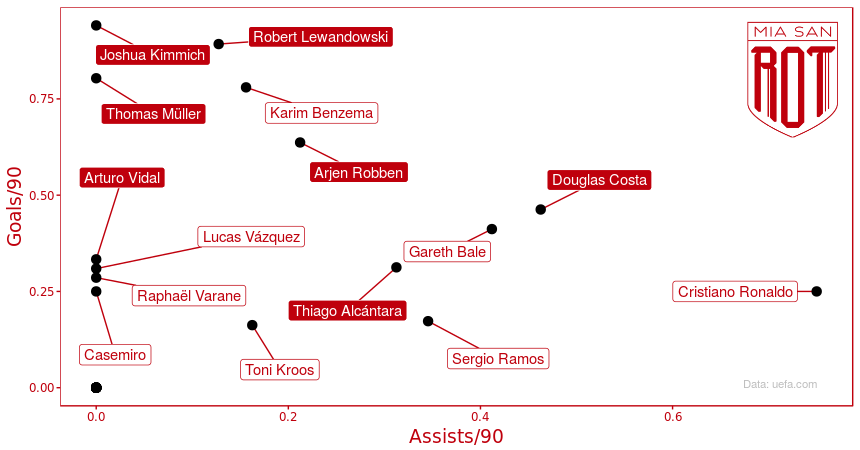
An often underrated factor for Real Madrid is Marcelo. The Brazilian is rarely the talking point. He is providing an important dynamic for Zidane’s system with his advances going forward. He isn’t only taking the load off Ronaldo and the respective central midfielder on the left, he also has the technical ability as well as football intelligence of an attacking midfielder.
Robben and Lahm will probably form Bayern’s right side. Their role will be decisive. Together with Thiago or Vidal, whoever’s close at that moment, in a best case scenario they force Marcelo to stay in his own half. He’s not the only factor in Madrid’s game, however he’s a big one whose constraint would be an asset.
Benzema is very similar to Lewandowski from the player profile. He’s even slightly better at creating connections, escaping his marker and setting up his teammates, especially Ronaldo. The central defence of Bayern would be well-advised not to let the Frenchman draw them out of the formation. It will be vital to defend his movement with flawless and quick switching of the marker.
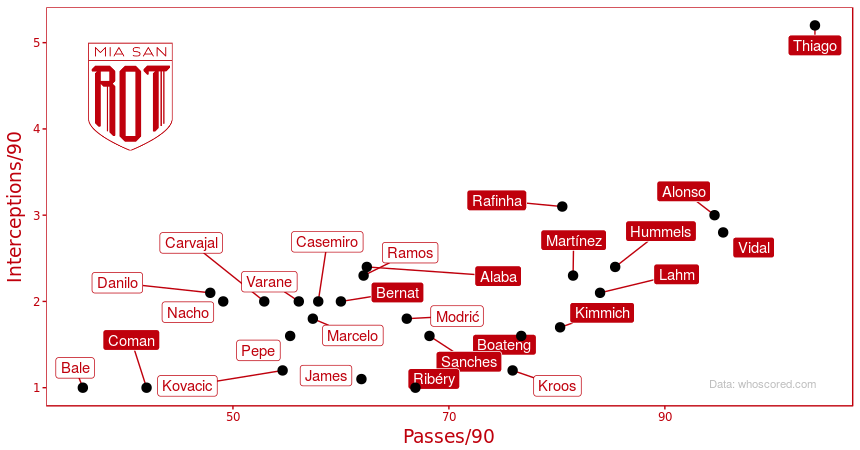
Xabi Alonso, who will probably start at defensive midfield, has to find two perfect days which will bring him the reaction speed of the second leg against Atlético Madrid a few months ago. On Saturday the veteran was in very good form. He won’t just have to look out for Benzema behind him, together with Thiago and Vidal he has to tackle the most important task.
As previously mentioned, Bayern were defeated in 2014 because they lacked control in midfield. Schweinsteiger and Kroos were at times overwhelmed by the pressing and were involved in situations by their teammates, which simply had to lead to a loss of possession.
This has to be avoided through clever positioning and enough connections. Admittedly, Bayern don’t have Guardiola’s nearly perfect positional play anymore, but they still have Thiago. Together with Alonso he will have to structure the play of his team. The two Spaniards will have to escape the pressing, enabling them to get more dangerous balls into the final third, unlike Bayern’s midfield in 2014.
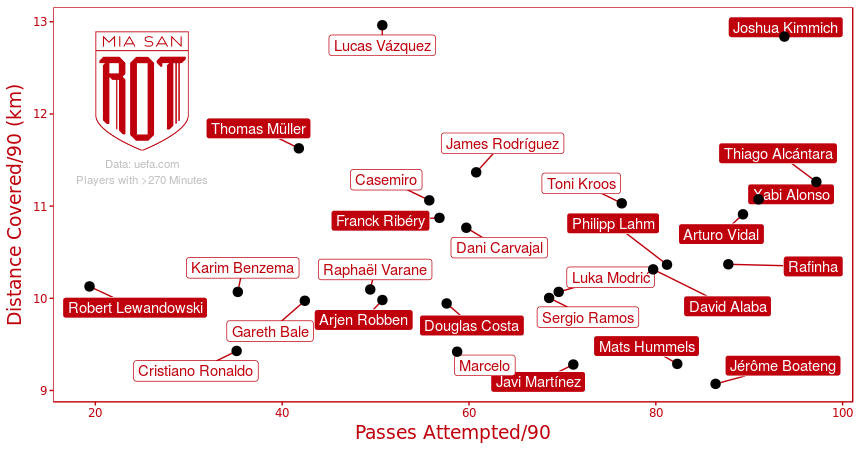
Another advantage to the previous meeting is the constellation around Vidal and Thiago. We’ve repeatedly analysed that both form the best pressing duo in the Bundesliga, possibly even in Europe. If they ignite their elemental force against the ball it’ll be much harder for Kroos and Modric to control the game like Ancelotti’s Real did back then.
Modroc and Kroos are hard to defend for different reasons. The Croatian opens spaces with diagonal dribblings a regular human wouldn’t even recognise. And there’s the former Bayern player Kroos who was pilloried by a lot of fans for his square passes.
The German has developed, though. While his partner opens spaces with runs and dribblings, Kroos is doing it with passes, that can tear apart an opponent within seconds. And yet he hardly plays the final ball. His passes are the ones getting the attack into the best scoring position possible.
Both will issue a challenge to Thiago and Vidal, whose result will show if they are the best duo against the ball. These four players will play a massive part in the outcome and course of the two games.
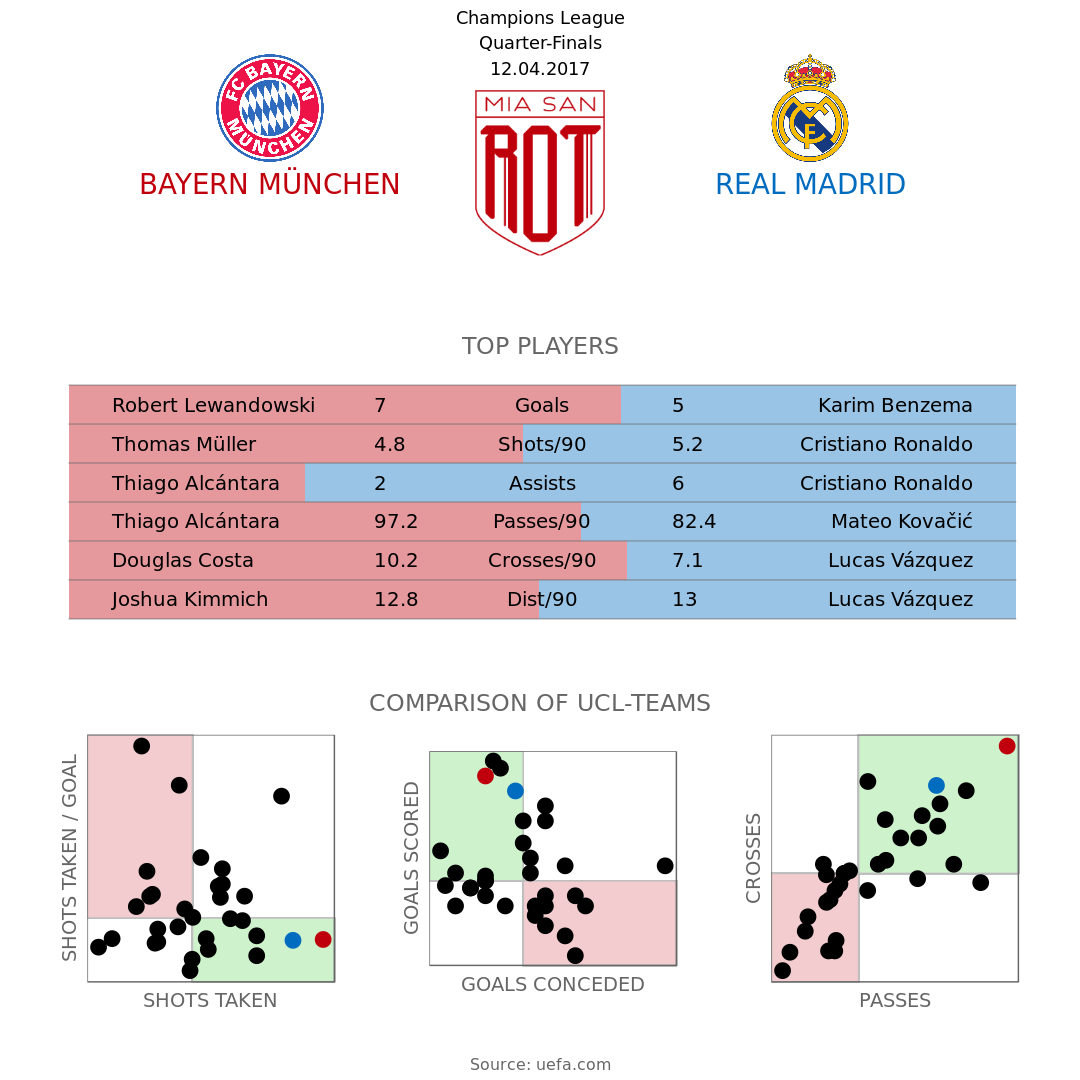
Tactical setups and possible course of the game
How both teams will line up should be obvious. Real Madrid will look for a similar approach like 2014, while Bayern are probably changing a few things.
Under Ancelotti there have been phases, where the German champions falls back, presses deeper and allows the opponent to move forward slightly. If one disrupts Modric and Kroos in their actions however, it can be very promising. A lot of goals have only been scored in the past weeks, because the pressing is distinctively more effective than it was in the first half of the season.
If FC Bayern is in possession, it’ll be a similar game to the one three years ago. And I definitely don’t mean that in a negative way. Munich still want to control with the ball.
The glaring difference from now to back then is, that long balls are utilised and the play of Munich has become more vertical. A similar pressing from Real in 2014 would be risky. It would leave gaps one can only allow oneself against Barcelona or the early Guardiola Bayern, who were too fixated on their short passing.
With quick combinations, a lot of movement and a lot pressing resistance it’s still possible to open big gaps behind Kroos and Modric. The question will be if Zidane will field a covering defensive player in Casemiro or a more attacking option like Isco, who could additionally pressure the build-up play of the Ancelotti eleven. Both variants come with advantages and disadvantages.
If Real play with a defensive midfielder it’ll be harder for Bayern to get between the lines. Similar to the second leg in 2014. Alonso was on the pitch there, a much more technically adept protagonist, who could deal with the pressure much better than Casemiro would be.
The more attacking solution would increase the pressure going forward, although it would open the aforementioned gaps when the midfield moves up. Particularly as Ramos doesn’t always look solid in defence.

In the case of Ramos there is obviously another facet to the duel: set pieces. In the flashback we assessed that Bayern also lost because of that. FC Bayern have to be on alert on corners and crosses, but shouldn’t give away too many free kicks. If necessary, Ramos will score the deciding goal in the fifth minute of injury time and therefore a focus of the preparation should be on those situations.
Similar to Bayern, Real Madrid like to cross the ball if there is no better solution. In the league they’ve already scored 25 goals after set pieces and they’re masters in salvaging last minute wins.
Altogether two games are awaiting, which will be decided by individual class, mentality and pure will rather than tactical facets. Real will play organised, aggressive and look for the counter.
It’s important for both teams, that the personnel situation is looking good. Bayern will miss Hummels due to an ankle injury and for Real most players are fit. Merely Varane and Pepe, who was subbed off with a fractured rib, will miss the games. Ramos will be partnered by Nacho, who is playing a good season, but is lacking the physicality of the other defenders. Possibly a small advantage for Lewandowski.
In the end the team that’s going to be there in the big moments will advance to the next round. Be it a challenge in midfield, a set piece or a lucky goal in extra time. Real Madrid and Bayern Munich are more similar, than it seems in the tactical analysis. They are unique in Europe, because they possess the quality to turn around a game at any point.
Furtmermore, they’re meeting at eye level. Most key players are at their prime and will clash on the highest level. This makes it even more exciting. Munich are going into the 23rd and 24th round against the Galacticos in the Champions League and it promises to be a cracker.
Five bold predictions for the first leg
- FC Bayern will win the game.
- Lewandowski scores.
- Arjen Robben will be directly involved in at least one goal.
- Real Madrid will also score.
- At least three yellow cards will be shown.
Five bold predictions for the second leg
- FC Bayern will advance to the semi-finals of the Champions League.
- Real will score again.
- Munich won’t win the second leg in 90 minutes.
- Arjen Robben will be directly involved in a goal again.
- Ronaldo won’t be involved in any goals in both legs.
The BVB preview was a bullseye. All five predictions were correct. Overall: 97/180.
Translations by Sam, Bettina & Michael.



